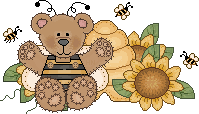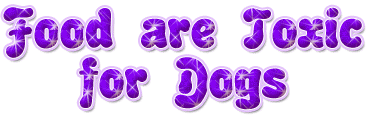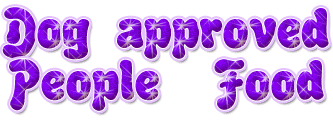
What foods should you never
feed your dog?
There are certain foods that you should not feed your
dog
under any occasion. While individual cases will vary based
on
breed, weight, and other factors - ingeneral this list of foods
applies to all dogs and should be carefully followed to
avoid
accidents.
Just because humans like it, doesn't mean dogs will
List of foods not to feed your dog.
Here's an alphabetized list of foods that are unsafe and
unfit
for canine consumption, many of which are toxic for dogs.
We'll
be updating it and adding foods as we learn more.
* Alcohol -It can cause not only intoxication, lack of
coordination,
potentially even coma and/or
death.
* Apple Seeds - they contain a natural chemical that
releases
cyanide when digested. Be sure to
core and seed apples.
* Avocado - they contain Persin, which can cause
diarrhea,
vomiting, and heart
congestion.
* Baby Food - by itself isn't terrible, just
make
sure it doesn't contain any onion
powder.
* Bones - the danger with bones isn't the
nutritional content,
nor is it necessarily the danger
of chocking. They can
harm your dog's digestive tract when
the bones
splinter inside the body.
* Candy & Chewing Gum - not only does candy
contain sugar, but
it often contains Xilotyl, which can
lead to the over-release of
insulin, kidney failure, and
worse.
* Cat Food -this contains proteins and fat levels that
are too high
for a dog 7 not healthy.
* Chocolate - contains
caffeine, theobromine and theophylline,
which can be toxic, cause panting,
vomiting, and diarrhea, and damage
your dog's heart and nervous
systems.
* Citrus oil extracts - can cause vomiting. *Coffee-
essentially this is the
same poison as chocolate.
* Corn on the cob - this is a sure way to get your
dog's intestine blocked.
The corn is digested, but the cob
gets lodged in the small intestine, and
if it's not
removed surgically, can prove fatal to your dog.
* Fat Trimmings - can cause pancreatitis.
* Grapes & Raisins - they contain a
toxin that can cause severe
liver damage and kidney
failure.
* Hops - an ingredient in beer that can be toxic to your dog, causing panting,
an
increased heart rate, fever, seizures, and even death.
* Human Vitamins - some are okay to use, make sure there's no iron as it can
damage the digestive system lining,
and prove poisonous for the liver and kidneys.
* Liver - it contains quite a bit of Vitamin A,
which can adversely affect your dog's
muscles and bones.
* Macadamia Nuts - these contain a toxin that can
inhibit locomotory activities,
resulting in weakness, panting,
swollen limbs, and tremors as well as possible damage
to your dog's digestive, nervous, and muscle systems.
* Marijuana - it can affect
the dog's nervous system and heart rate, and induce vomiting.
* Milk and dairy products - usually cause smelly farts & some nasty cases of diarrhea,
most dogs are lactose
intolerant.
* Mushrooms - Just as the wrong mushroom can be fatal to humans, the same applies
to dogs. Don't mess with them.
* Onions, Garlic, & Chives -of any kind are poisonous for dogs. They contain disulfides
& Sulfoxides, which can cause
anemia & damage red blood cells.
* Persimmon seeds, Peach & Plum pits can cause intestinal
obstruction and enteritis.
* Potato, Rhubarb, & Tomato
leaves, contain oxalates, which can adversely affect the
digestive, nervous, and urinary
systems.
* Raw Eggs - the most obvious problem here is
salmonella, eggs also contain the Avidin
enzyme, which inhibits the absorption of vitamin B. Your dog uses vitamin B to keep
a healthy coat and skin.
* Raw fish - Loss of appetite will become on,
followed by seizures, and in rare instances, death.
* Salt - can lead to an imbalance in electrolyte levels, dehydration & possibly diarrhea.
* String - If your dog were to eat a string, it could
get stuck in their digestive tract and
cause complications.
* Sugar - this applies to any food containing sugar
including corn
syrup as too much can lead to
dental issues, obesity, and even diabetes.
* Tobacco - Nicotine can damage your dogs
digestive & nervous system, and even cause death.
* Yeast - can rise and expnad in your dog's stomach which could cause their stomach or
intestines to rupture. Mild cases will cause gas, farting and a lot of discomforts.
* Old food - The bacteria in spoiled food contains all
sorts of toxins that can be
damaging to your dog's health.
There's a reason there is food & treats made especially for
dogs.
Safe Human Foods for Dogs.
There are human foods that are permissible to feed to your
dog;
however, even these foods should be kept to a minimum. Things
that you can feed to your dog without worrying about side
effects include:
Lean meat – lean meat includes meat without bones
that has had
excessive fat removed. If feeding chicken and turkey, the
skin
should also be removed as it can be a source of fat. Lean
meat
includes the white meat from chicken or turkey and provides
a
tasty treat for your dog as well as a good source of
protein.
Fruits – Not including the fruits listed above, dogs can
safely
enjoy bananas, apple slices,
strawberries, blueberries and
watermelon. The seeds should be removed from these fruits
or
in the case of watermelon it should be a seedless melon as
most
fruit seeds contain arsenic which is poisonous. Fresh fruits
are a
great treat to assist in training your dog and can also
provide
your dog with a great way to cool down on a hot summer
day!
Vegetables – Certain vegetables like carrots, green
beans,
cucumber slices or zucchini slices all make great treats
for
your dog. It’s a good idea to replace commercial dog treats
with
baby carrots if you are looking to slim your dog down a
little bit.
Vegetables make great low calorie snacks and good training tools
as well. But stay away from canned and pickled vegetables
as
they contain too much salt.
Baked potatoes – A plain baked potato is okay to feed your
dog
but honestly it is not
something that should be done frequently
and should never include any toppings. A few slices of
cooked
baked potato can make a great treat for a patient dog at a
meal time though.
White rice and pasta –
White rice and pasta are frequently referred to as a
potential
meal for a dog with an upset stomach. Generally boiled
white
chicken and white rice are used to help firm up stools as
well
as nourish a dog that is having trouble getting any
nutrition from
food as a result of illness. While there are certainly
some
human foods that are safe to feed your dog there are
many
which are unsafe and potentially poisonous when ingested by
your
dog. As a general rule of thumb, it is far better to be safe
than
sorry so avoid feeding your dog any human food unless
recommended by your vet. Dogs that are not given human food
or table scraps are generally better behaved than dogs who
do
receive people food anyway, they do not beg because they
know
they won’t receive any scraps and they also tend to drool
less
andbother
visitors to your homeless because they understand
that human food is for humans and not for them.
Foods that are perfectly suitable for human consumption,
as
well as other animals, may be toxic and even poisonous to
your
dog, posing a serious threat to its health and well-being. Why?
Because all animals have very different rates of
metabolism.
Metabolism is basically the process of breaking down food
and
turning it into energy. Please note that while we're
attempting
to add every food we can find that is potentially unsafe for
dogs,
there are certain foods that we may miss, so don't consider
a
food safe to feed to our dog just because it's not on this
list.
Dogs should eat dog food. Table
food or food intended for
human consumption can result in a multitude of problems for
your animal's health if eaten or drank.
Chocolate is a well-known potential toxin for pets. It is
metabolized in the animal's body that loosely mimics the way
cocaine is metabolized by a human. Bakers chocolate and dark
chocolate
are more potent than milk
chocolate in terms of
toxicity to animals. The toxicity associated with chocolate
is
dose-dependent and varies with each individual animal's
sensitivity.
It would take much more chocolate to make a Labrador sick
than it would a Chihuahua. Raisins and grapes are both toxic
to
dogs and cats as they can cause damage to their kidneys.
Other
commonly encountered foods that are toxic to pets include
coffee,
onions, macadamia nuts, and avocados.
Fatty foods or simply foods that your pet is not accustomed
to
consuming can also cause problems such as vomiting,
diarrhea,
and even full-blown pancreatitis. It is my opinion that no animal
bones (rib, chicken, etc.) should ever be given to pets. I
have
seen too many animals become ill, need surgery to correct an
obstruction, and even die from being fed animal bones. Bones
can cause intestinal obstruction and/or splinter resulting in
a
lacerated gastrointestinal tract.
Keep Your Pet Away From The Car Shop and Medicine Cabinet!
Chemicals, medications, and other toxic substances that are
common problems include antifreeze/coolant, gasoline, oil,
pesticides, non-steroidal anti-inflammatory drugs
(ibuprofen,
aspirin, etc.), acetaminophen, and rodent bait. Antifreeze
is
extremely dangerous if ingested. Dogs and cats are attracted
to antifreeze due to its sweet smell and taste. Antifreeze
can
quickly destroy your pet's kidneys leading to critical illness
and
commonly death. Non-steroidal anti-inflammatory drugs are
often helpful for many pets just like they are for many humans,
but can be harmful or fatal if used without the guidance of
a
veterinarian.
Even Plants Can Be Dangerous to Your Pet.
Lastly, I wanted to mention some common plants found in
homes
and yards that can be hazardous to your pet. Lantana,
oleander,
elephant ear, belladonna, lilies, and even aloe can all be toxic
and harmful if ingested. This is a very abbreviated list and it
is
always best to educate yourself more thoroughly about the
plants around your home and their potential as being toxic.
Consult With Your Local Veterinarian
This is only a short list of potentially harmful things that
are
commonly eaten, chewed, or drank by dogs and cats. It is
always best to consult with your veterinarian or poison
control
authority if you have a question or emergency.
How to Cure Your Dog's Upset Stomach?
Is your dog's stomach upset?
Normally dogs will eat grass to cleanse out their system - this is
the natural method
for curing your dog's upset stomach. However, at times this won't
do the trick, or
your dog won't even feel like eating grass. In this
case, it can help to give your dog a
little bit of Pepto-Bismol or Pepcid crushed and mixed with water
(the amount will
depend on your dog's weight - consult your veterinarian). It is
possible that the
manufacturers of these products may change their formulas over
time and they may
not be as safe as they once were for pups so, as with any
treatment, always consult a
vet before proceeding with treatment.
You could also take your dog's temperature. We recommend using a
rectal
thermometer as it is the most accurate option. An ear thermometer
is also an option
but not as precise. A dog's normal body temperature should be
about 101.5 degrees
Fahrenheit. A temperature of 102 or higher is considered to be a
fever. If the
temperature is higher than 102 degrees or lower than 99 degrees, you should go to
the vet or emergency vet hospital
immediately to find out the cause.Note that the
Pepto-Bismol or Pepcid may make your dog's stool darken quite a
bit - this is not a
reason for alarm.
Keep your pup hydrated!
Dogs are like people in the way that their symptoms have a lot to
do with an underlying
problem. If your dog has an upset stomach, you would do well to
wonder about the cause
of the upset stomach just as much as the treatment of your
dog’s upset stomach.
One of the most important thing is to keep your pup hydrated at all times. This is especially
important if they are experiencing diarrhea. With diarrhea, they
may very quickly
(within hours) become dehydrated, as they will lose water that
they would retain under
normal conditions.
Natural ways to cure your dog's upset stomach. If you prefer not
giving your dog human
medications like Pepto Bismol, and your dog won't eat grass to clear her or his upset
stomach, there are other natural
home remedies that can do the trick. However, these may
not be the best cure for your dog, so make sure you check with
your veterinarian before
proceeding. Some natural home remedies include: • Rice • Boiled
chicken (boneless and no
salt added) • Banana baby food Do not use hamburger meat - this is
a fairly common
recommendation on bulletin boards, but the fact is the meat is too
greasy and will not
help your dog's upset stomach (nor is it healthy for your dog). No
matter what you choose,
however, make sure your dog stays well hydrated. The point of the
grass is to make your
dog vomit, to clear out whatever is upsetting his or her stomach.
For more serious situations,
your best bet is to limit food intake, keep getting your dog
water, and take them to the vet.
What did your dog eat that upset their stomach? If you can find
out what your dog ate,
it may help the vet's diagnosis of your situation. One of the
first things to look for is if
any of your houseplants have been eaten. Many houseplants are toxic to dogs.
Changing Your Dogs Food Can Upset its Stomach. When changing your
dog’s food, always
take caution and time to ease them into the new food. If you change their food overnight
from one kind to another, it will
often be hard for them to digest. Think about it, if you
were eating only chicken and rice for two years and then someone
changed your diet for
your next meal to beef and potatoes, your body would have
difficulty digesting as well and
likely lead to stomach cramping, bloating and maybe even diarrhea
or vomiting. If your body
is out of practice with digesting a certain type of food and you
introduce it into your diet
again, your body will need time to adjust to this change. That is
exactly what is happening
to your dog in this case. So make
sure you still have some of your dog's current food to allow
time for the transition. Over the course of about a week, slowly
start mixing in more and
more of the new food into less
and less of the current food until the transition is complete.
Read our article on changing dog food for more specific details.
Go slow and keep an eye on
your dog while changing food to make sure he remains healthy.
Consult your vet if you have
any questions during this process of changing dog food or run into
any health concerns.
Hope Your Dog is Feeling Better Soon.
If none of these solutions work or you are very worried about your
pet, please go see a
veterinarian to help guide you through this difficult time. If you
have other treatments
that you have tried successfully to get your dog on its way to
recovery, please share them
below with a comment. As dog owners ourselves, we know how
difficult it can be to see your
pup suffer so we sure do hope your dog is feeling better
soon.
Why do Dogs Get an Upset Stomach? Although dogs will eat most
anything you put in
front of them, their stomachs don’t always agree to this free for
all type of consumption.
One of the most likely causes for an upset stomach is a change in
diet. You can’t assume
that they have eaten something unhealthy either. Sometimes they
get an upset stomach
from something as simple as a change in brands or flavors of dog
food. If this isn’t the case,
you might start searching for another reason, such as an
illness.
Dangers of an Upset Stomach.
Aside from the fact that our dog is likely to be uncomfortable and
even in pain, the
upset stomach may be a symptom of
an underlying issue. Your dog may have something
as mild as the flu or as life-threatening as the Parvovirus. If your dog has a bacterial
infection or a virus, they are likely to show other signs along
with the upset stomach.
Should the condition persist, the most dangerous threat is likely
to be dehydration.
This occurs when the body is unable to retain fluids. Water makes
up around 75% of the
body weight of dogs, but even consuming large amounts of water may
not be enough to
prevent dehydration in your dog.
Signs of Dehydration.
Dogs are like people in the way that their symptoms have a lot to
do with an underlying
problem. If your dog has an upset stomach, you would do well to wonder about the cause
of the upset stomach just as much
as the treatment of your dog's upset stomach. Dog's,
and especially young pups are very susceptible
to occurrences of dehydration, much the
way humans are. If you notice that your dog has diarrhea or
doesn't seem to have an
appetite or be interested in drinking his or her water, then your dog is taking the first
step towards dehydration.
You can check to see if your dog
is already dehydrated by assessing the appearance of
his or her skin and gum. If
you lift the lip of your dogs, the gums should be coated with
a shiny wet film. If not, then he or she may be dehydrated. To
check the skin to see if
your dog is dehydrated, squeeze the skin behind the neck as if you
were going to pick your
dog up as his or her mother would. Release the skin. If the skin
stays in the pinched position,
your dog is dehydrated. If it
automatically goes back to lying flat on the neck, your dog is
not dehydrated. This is the same method used to check humans. If
you’ve ever had someone
pinch the skin on your hand and
then watch to see if it goes back to its original form, you
have experienced the same kind of dehydration test.
We try to keep our dogs on their canine diets but sometimes
we just can’t resist slipping them an occasional human morsel.
If you’d like to reward your pet with a table scrap, make sure
that you choose people foods that are safe for canine tummies.
Here are a few “dog-approved” people foods:
1. Peanut butter. A favorite treat of many canines. Not only
is it a good source of protein, but it also contains heart healthy fats, vitamin B, niacin, and vitamin E.
Stuff peanut butter into a Kong to keep your dog busy for hours. Choose raw, unsalted peanut butter.
2. Cooked chicken. Can be slipped into the bowl along with your dog’s regular food
to add a spice and extra protein to its diet.
This also makes a good meal replacement if you’re in a pinch and out of dog food.
3. Cheese. A great treat for a dog as long as she isn’t lactose intolerant,
which a small percentage are. Make sure to monitor
your dog’s reaction. Opt for low or reduced fat varieties and don’t overfeed, as many cheeses
can be high in fat. Cottage cheese is typically a good choice.
4. Baby carrots. Good for a dog’s teeth, carrots are low calorie and high in fiber and beta carotene/vitamin A.
5. Yogurt. High in calcium and protein. But make sure to only choose yogurts that do not contain artificial sweeteners or
added sugars. Yogurts with active bacteria can act as a probiotic and are good for your dog’s digestive system.
6. Salmon. A good source of omega 3 fatty acids, which are responsible for keeping your dog’s coat healthy and shiny, as
well as supporting your dog’s immune system. Feed your dog
cooked salmon, add salmon oil to her food bowl, or slip him
some of your unwanted fish skins.
7. Pumpkin. Good source of fiber as well as beta-carotene/
vitamin A. It can help keep the GI tract moving and can aid
with digestive issues.
8. Eggs. Scrambling up an egg for your pup is a great way to
give her diet a protein boost. Eggs are also a source of easily digestible riboflavin and selenium, making them a healthy snack.
9. Green Beans.Make a great treat for your dog since they are filling and low in calories. Select beans that have no added salt.
10. Apple Slices. Help to clean residue off a dog’s teeth, which helps to freshen her breath. Apples are a good source of fiber
as well as vitamin A and C. Make sure to take out the seeds and the core before feeding to your dog, as these can be choking hazards.
11. Oatmeal. A great source of soluble fiber, which can be especially beneficial to senior dogs with bowel irregularity issues.
It is also a great alternate grain for dogs allergic to wheat.
Make sure to cook oatmeal before serving it to your dog. Do not add any sugar or flavor additives.
These are just a few of the human foods that you can toss your dog’s way. Remember to try them in small amounts. If your dog experiences any sort of reaction, immediately consult a veterinarian.
Before giving your dog any people food, do your research to make sure it’s safe. Never feed your dog toxic
human items such as: chocolate, onions, grapes, raisins, yeast dough, artificial sweeteners, macadamia nuts, avocados, alcohol,
or coffee. Consult your veterinarian with any questions
on what is safe and what is harmful.











